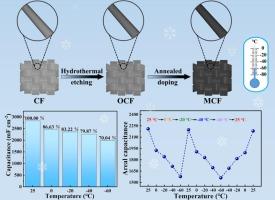当前位置:
X-MOL 学术
›
Chem. Eng. J.
›
论文详情
Our official English website, www.x-mol.net, welcomes your
feedback! (Note: you will need to create a separate account there.)
Low temperature electrochemical properties and energy storage mechanisms of gently modified porous carbon fabric-based flexible supercapacitors
Chemical Engineering Journal ( IF 13.3 ) Pub Date : 2024-11-15 , DOI: 10.1016/j.cej.2024.157620 Mingliang Xiang, Jing Liao, Ni Wang, Liangkui Sun, Lixiang He, Xingchen Xie, Sridhar Komarneni, Gunel Imanova, Wencheng Hu
Chemical Engineering Journal ( IF 13.3 ) Pub Date : 2024-11-15 , DOI: 10.1016/j.cej.2024.157620 Mingliang Xiang, Jing Liao, Ni Wang, Liangkui Sun, Lixiang He, Xingchen Xie, Sridhar Komarneni, Gunel Imanova, Wencheng Hu

|
The development of a low-temperature-resistant flexible energy storage device represents a significant challenge that requires urgent attention. In this study, the electrochemical properties of modified carbon fabric (MCF) were significantly improved by applying mild surface modification techniques. The resulting MCF-based symmetrical supercapacitors (SSCs) were assembled using conventional sulfuric acid as the electrolyte and demonstrated remarkable resilience to extremely low temperatures of −60 °C while exhibiting excellent electrochemical performance. Specifically, the optimal area capacitance relative to 25 °C was 2831 mF cm−2, and the areal capacitance at 0, −20, −40, and −60 °C was maintained at 86.63 %, 83.22 %, 79.87 %, and 70.04 %, respectively, exhibiting outstanding low-temperature resistance. The capacitance retention rates of the lifetime tests at different temperatures were found to be above 90 %, further supporting the excellent cycling stability of the SSCs. In addition, the factors contributing to the differences in electrochemical performance at different temperatures were analyzed mechanistically by combining the experimental results and molecular dynamics (MD) simulations. Furthermore, the areal capacitance of the assembled flexible SSCs was found to be reversibly retained even after continuous temperature tests between 25 and −60 °C. Moreover, even at −60 °C, the areal capacitance was maintained by 71.42 % at 25 °C, and the capacitance retention was up to 90.32 % after undergoing 10,000 cycles. This research indicates that MCF electrodes have the potential to be used as electrodes for flexible energy storage devices that are low-temperature resistant, stable and low-cost.
中文翻译:

温和改性多孔碳织物基柔性超级电容器的低温电化学性能和储能机制
耐低温柔性储能器件的开发是一项亟待关注的重大挑战。在本研究中,通过应用温和的表面改性技术,改性碳织物 (MCF) 的电化学性能得到了显著改善。所得的基于 MCF 的对称超级电容器 (SSC) 使用传统硫酸作为电解质组装而成,在 -60 °C 的极低温度下表现出卓越的弹性,同时表现出优异的电化学性能。具体来说,相对于 25 °C 的最佳面积电容为 2831 mF cm-2,0、-20、-40 和 -60 °C 时的面电容分别保持在 86.63 %、83.22 %、79.87 % 和 70.04 %,表现出出色的耐低温性。发现不同温度下寿命测试的电容保持率高于 90 %,进一步支持 SSC 出色的循环稳定性。此外,通过结合实验结果和分子动力学 (MD) 模拟,从机械上分析了导致不同温度下电化学性能差异的因素。此外,发现即使在 25 °C 和 -60 °C 之间连续温度测试后,组装的柔性 SSC 的面电容仍可逆地保留。 此外,即使在 −60 °C 下,在 25 °C 时,面电容也保持了 71.42 %,经过 10,000 次循环后,电容保持率高达 90.32 %。这项研究表明,MCF 电极具有用作耐低温、稳定和低成本的柔性储能器件的电极的潜力。
更新日期:2024-11-20
中文翻译:

温和改性多孔碳织物基柔性超级电容器的低温电化学性能和储能机制
耐低温柔性储能器件的开发是一项亟待关注的重大挑战。在本研究中,通过应用温和的表面改性技术,改性碳织物 (MCF) 的电化学性能得到了显著改善。所得的基于 MCF 的对称超级电容器 (SSC) 使用传统硫酸作为电解质组装而成,在 -60 °C 的极低温度下表现出卓越的弹性,同时表现出优异的电化学性能。具体来说,相对于 25 °C 的最佳面积电容为 2831 mF cm-2,0、-20、-40 和 -60 °C 时的面电容分别保持在 86.63 %、83.22 %、79.87 % 和 70.04 %,表现出出色的耐低温性。发现不同温度下寿命测试的电容保持率高于 90 %,进一步支持 SSC 出色的循环稳定性。此外,通过结合实验结果和分子动力学 (MD) 模拟,从机械上分析了导致不同温度下电化学性能差异的因素。此外,发现即使在 25 °C 和 -60 °C 之间连续温度测试后,组装的柔性 SSC 的面电容仍可逆地保留。 此外,即使在 −60 °C 下,在 25 °C 时,面电容也保持了 71.42 %,经过 10,000 次循环后,电容保持率高达 90.32 %。这项研究表明,MCF 电极具有用作耐低温、稳定和低成本的柔性储能器件的电极的潜力。


















































 京公网安备 11010802027423号
京公网安备 11010802027423号